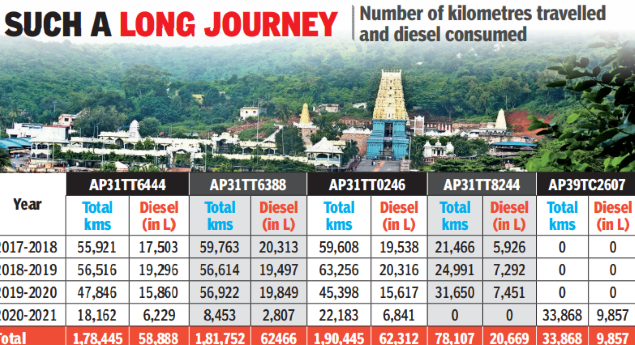
VISAKHAPATNAM: Sri Varahalakshmi Narasimha Swamy Vari (SVLNS) Devasthanam, Simhachalam, is planning to replace its existing fleet of diesel buses with electric ones.
The four buses of Devasthanam have covered about 6.6 lakh kilometres on the ghat road in the last four years, plying devotees from the foothills to the temple on the hill.

The ‘electric mobility’ proposal came in the wake of the suggestion made by the chairman of the Simhachalam temple trust board and former civil aviation minister P Ashok Gajapathi Raju. The founder family member of SVLNS Devasthanam and 104 group temples earlier asked the temple authorities to evaluate the feasibility of procuring electric buses to replace the fuel-run buses. Again in his recent letter, dated January 14, Ashok Gajapathi Raju has sought a report on the progress of the proposed initiative.
Consequent to this, the temple authorities obtained quotations from an electric bus manufacturer. While the 9-metre electric bus is quoted at 1.55 crore, the 7-metre variant is supposed to cost around 1.45 crore for an outright purchase.
Meanwhile the Simhachalam officials made inquiries with the APSRTC officials, who are planning to operate 50 electric buses on Tirumala-Tirupati ghat road. The RTC officials informed that they got approval from the ministry of heavy industries under phase-II of faster adoption and manufacturing of hybrid and electric vehicles (Fame-II) scheme to ply electric buses on an operating expenses basis.
They also provided the Simhachalam officials the details of the pricing quotations taken from an electric bus manufacturer for operating the buses on an operating expenses basis.
Executive officer, SVLNS Devasthanam, MV Suryakala, said the work order, guidelines, and tender documents will be placed for further deliberations before the Trust Board in the ensuing meeting to introduce electric buses.
The proposed ‘electric mobility’ initiative is expected to come with many benefits such as saving on fuel costs and fuel consumption which in turn cut down on pollution and greenhouse gas emissions. On the state government’s side, measures are being taken to set up nearly 400 charging stations for electric vehicles across the state under Fame-II scheme.







